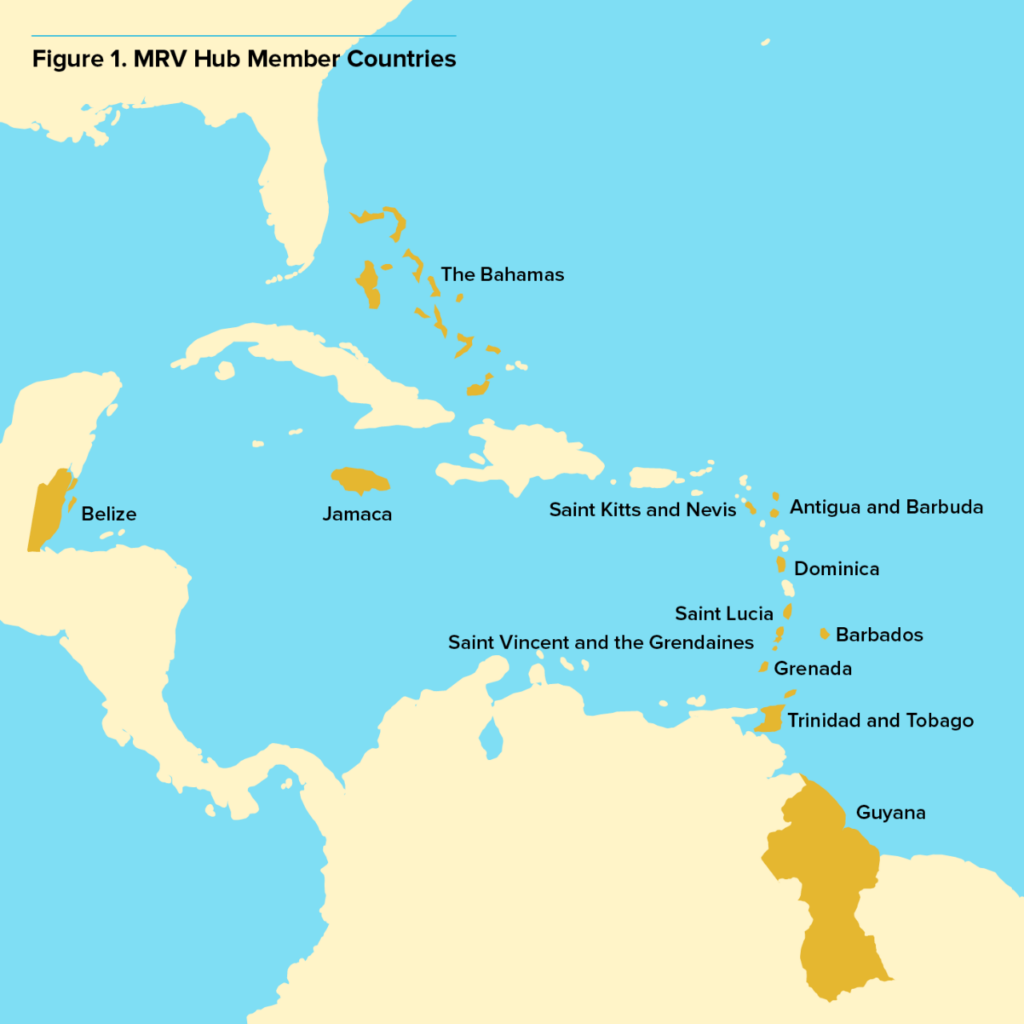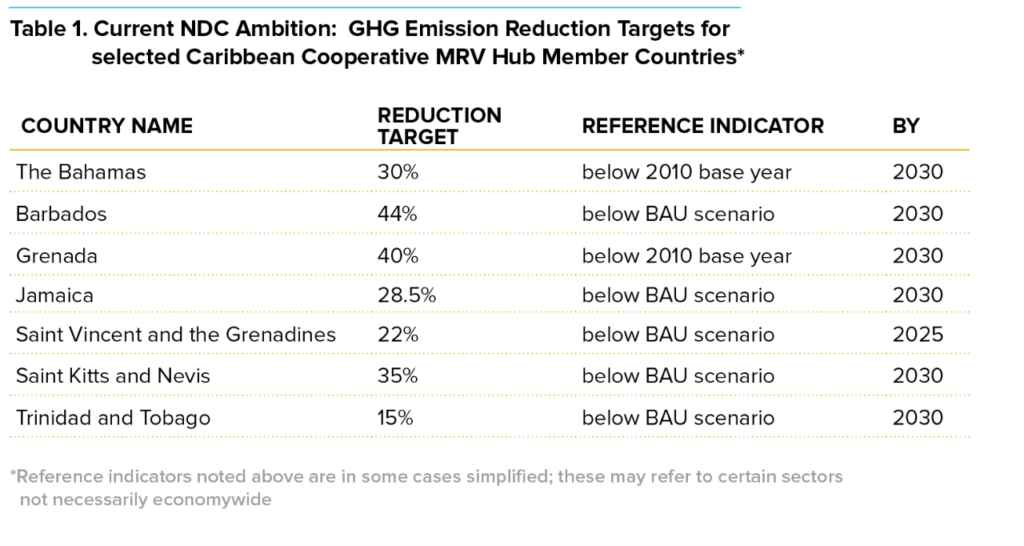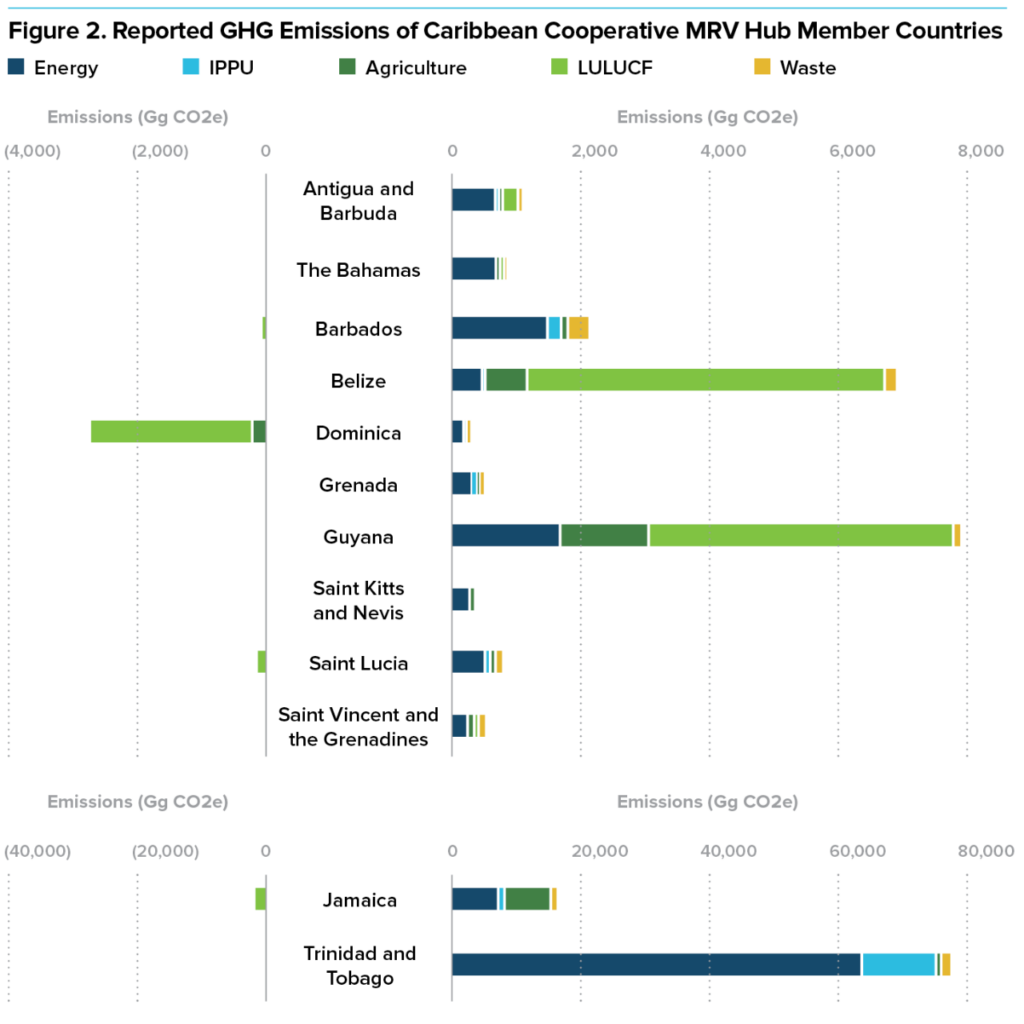As climate change impacts grow more severe, countries need to be smarter, more ambitious and more resource efficient in their response. The Caribbean’s regional approach to track progress on climate action is an innovative example of this. To date, country climate action plans – known as Nationally Determined Contributions or NDCs – cumulatively fall well short of the Paris Agreement’s 1.5-2⁰C targets. This article presents a new way of thinking on how to improve NDC implementation efficiency across national boundaries based on regional cooperation to track implementation.
Challenges particular to small island nations
Small island nations are among the world’s most vulnerable countries and yet have been at the forefront of fighting the climate change crisis – playing a leading role in raising awareness and advocating for transformative climate action while making ambitious climate commitments and urging the international community to do the same. Despite their bold commitments, small islands rarely have the opportunity to achieve economies of scale due to their small market sizes. Smaller populations also tend to coincide with a smaller pool of local experts; thus pooling resources through a cooperative initiative to support climate action is an attractive solution. For MRV systems, which are data collection and management systems that help countries identify sources of emissions, understand trends and design optimized emission mitigation strategies, small islands typically encounter challenges in creating their own NDC tracking mechanisms due to these resource limitations.
The Caribbean Cooperative Monitoring, Reporting and Verification Hub (the MRV Hub), based in Grenada, was established to remedy this problem. The MRV Hub works with ten independent island nations and two independent mainland countries – all members of the Commonwealth of Nations and the Caribbean Community (CARICOM) (see Figure 1). These Caribbean nations have pledged to work individually and collectively to track NDC indicators, share data and raise climate ambition.
At the core of the MRV Hub’s approach is the recognition that all Parties to the Paris Agreement must establish MRV systems to accurately track the progress (or lack of progress) their climate actions contribute towards the Paris Agreement goals.

Figure 2* shows the first regional compilation of the emission sources and sinks for all members based on the latest reports to the Unites Nations. The two heavily forested mainland countries stand out due to their high emissions from deforestation. For these coastal Caribbean nations, forest management and preservation will be an important challenge in the years ahead. All MRV Hub members are in the process of enhancing their MRV Systems, therefore, revisions to their greenhouse gas (GHG) emission estimates are expected as data quality and availability increases.
The unique regional approach of the MRV Hub
The MRV Hub’s cooperative model, taken across 12 sovereign nations, provides a first attempt to pioneer a regional approach for tackling climate change in groups of countries with much in common.
This project’s central innovation is the MRV Hub Model of regionally pooling institutional arrangements and human expertise in a multi-country cooperative endeavor to enhance climate change MRV or transparency systems. As such, the model manages to achieve economies of scale for expertise, climate data systems, reporting processes, and management approaches. Table 1 shows the current level of ambition for quantitative GHG emission reduction targets of the members, of whom all are expected to revise their NDCs in 2020-2021.
Furthermore, the MRV Hub functions as a learning and mentoring cooperative providing multi-country working sessions, bilateral mentoring, training sessions, academic fellowships, as well as tools and guidance to strengthen data management systems. A data portal is also being established to securely house and manage the national data for all members who wish to use a shared system.

Preliminary success factors for establishing the Regional MRV Hub include the following:
- The MRV Hub began its work by visiting each country and securing high-level government support via Memoranda of Understanding and data sharing agreements;
- Experts from the MRV Hub reviewed country national communications and biennial update reports, and consulted with the members who then established a national focal point to coordinate the work;
- Technical MRV System Status Assessments were developed to map each country’s needs and priorities;
- These findings fed into Capacity Building Reports that identify common regional obstacles and opportunities that need to be proritized;
- In collaboration with partners, a regional Roster of Experts was developed who now work alongside MRV Hub experts;
- Representatives from the MRV Hub’s member countries serve on the Steering Committee of the MRV Hub, thereby engendering ownership and commitment to the mission;
- The MRV Hub balances support to partner countries based on their current capacity and prioritized needs, and tailors training and technical services to individual circumstances; and
- The MRV Hub provides a clearinghouse for regional activities and highlights upcoming MRV training opportunities.
Next Steps
The level of buy-in from country partners remains strong, with the member countries reconfirming their support for the MRV Hub as a regional institution. The Steering Committee is in the process of evaluating business models to ensure the sustainability of the MRV Hub beyond the initial round of funding.
Many of the MRV Hub members have also taken the additional step of directly contracting the MRV Hub to procure services to support the development of their national MRV System. In these cases, the MRV Hub team arranges for the collaboration of national and regional experts, further building capacity in the region, and powerfully developing career options for young professionals in this field. Building on the work of creating MRV frameworks and national inventory systems, the MRV Hub has now shifted gears to developing modelling tools and guidance for projections and NDC revisions.
Beyond establishing itself as a regional institution to meet the needs of the Caribbean countries, the MRV Hub is also looking to replicate its model in other parts of the world. Based on emerging conversations with small island states across the globe, a new approach to regional cooperation on transparency may be emerging in the South Pacific region. Stay tuned.
About the MRV Hub
The MRV Hub is funded by the Government of Germany under a 5-year grant. It was established in late-2018 and is housed at St. George’s University in Grenada. Implementing project partners include the GHG Management Institute, the UNFCCC Regional Collaboration Centre, the Windward Isles Research and Education Foundation (WINDREF), and the UNDP/UN Environment Global Support Programme.
*Inventory Year shown in Figure 1 by Country: AB (2015); BAH (2000), BAR (2010); BEL (2009); DOM (2017); GRE (2014); SKN (2008); SL (2010); SVG (2004); GUY (2004), JAM (2012) and TT (2008).
Data Source and Report Submittal Date shown in Figure 2 by Country: AB (BUR1, 2020); BAH (NC2, 2015), BAR (NC2, 2010); BEL (UNFCCC, 2009); DOM (NC3, 2020); GRE (NC2, 2019); SKN (NC2, 2008); SL (NC3, 2017); SVG (NC2, 2016); GUY (NC2, 2012); JAM (NC3, 2019); and TT (NC2, 2013).
This article was authored by the UNDP NDC Support Programme and reposted with their consent. Click here to view the original article.
The Caribbean Cooperative MRV Hub (CCMRVH) is part of the International Climate Initiative (IKI). The Federal Ministry for the Environment, Nature Conservation and Nuclear Safety (BMU) supports this initiative on the basis of a decision adopted by the German Bundestag. The MRV Hub is also supported through the UNDP/UNEP Global Support Programme.


Comments